Medication-Grapefruit Interaction Checker
Medication Interaction Results
One small glass of grapefruit juice can turn a safe medication into a dangerous one. It doesn’t matter if you drink it in the morning, at night, or hours before your pill. If you’re on certain medicines, grapefruit can cause serious, even life-threatening side effects - and most people have no idea.
Why Grapefruit Changes How Medicines Work
Grapefruit doesn’t just taste sour. It contains chemicals called furanocoumarins, mainly bergamottin and 6’,7’-dihydroxybergamottin. These compounds attack an enzyme in your gut called CYP3A4. This enzyme normally breaks down many medications before they enter your bloodstream. When it’s blocked, your body absorbs way more of the drug than it should. This isn’t a mild effect. For some drugs, grapefruit juice can increase blood levels by 300% or more. And here’s the catch: the damage lasts for days. Once the enzyme is shut down, your body needs 24 to 72 hours to make new ones. That means even if you drink grapefruit juice at breakfast and take your pill at dinner, you’re still at risk. Other citrus fruits like Seville oranges, pomelos, and even some limes have the same chemicals. Pomegranate juice might too, though the evidence is less clear. Regular orange juice? Safe. Apple juice? Fine. It’s only specific citrus that causes trouble.Statins: The Most Dangerous Group
If you’re taking a statin to lower cholesterol, grapefruit could be putting you in serious danger. Statins are among the most commonly prescribed drugs in the world - and some of them react badly with grapefruit.- Simvastatin (Zocor): One 200ml glass of grapefruit juice can triple your blood levels. That raises your risk of rhabdomyolysis - a condition where muscle tissue breaks down, floods your kidneys, and can cause kidney failure.
- Lovastatin (Mevacor): Bioavailability jumps by up to 1,500%. This isn’t a typo. It’s a massive spike.
- Atorvastatin (Lipitor): Blood levels rise by 80%. Still risky, but less extreme than the others.
- Pravastatin (Pravachol) and Rosuvastatin (Crestor): These are safe. They don’t rely on CYP3A4 to break down, so grapefruit doesn’t touch them.
Calcium Channel Blockers: Blood Pressure Gone Wild
Many people take drugs like amlodipine, nifedipine, or felodipine to control high blood pressure. Grapefruit makes these drugs work too well - too fast.- Felodipine (Plendil): Blood levels spike by 355%. That can cause sudden, dangerous drops in blood pressure, dizziness, fainting, or even heart rhythm problems.
- Nifedipine (Procardia): AUC increases by 274%. The extended-release version (Adalat CC) reduces the risk a bit, but doesn’t eliminate it.
- Amlodipine (Norvasc): Blood levels rise by 150%. Even small amounts of grapefruit can push you into unsafe territory.
Immunosuppressants: A Silent Killer
People who’ve had organ transplants take drugs like cyclosporine, tacrolimus, or sirolimus to stop their body from rejecting the new organ. These drugs have a very narrow safety window. Too little? Rejection. Too much? Organ damage, infection, cancer.- Cyclosporine (Sandimmune): Blood levels rise by 50-60%. That increases kidney damage risk.
- Tacrolimus (Prograf): Levels can jump 300-500%. That’s enough to cause kidney failure or severe neurological side effects.
- Sirolimus (Rapamune): AUC increases by 1,100%. This isn’t just risky - it’s potentially fatal.
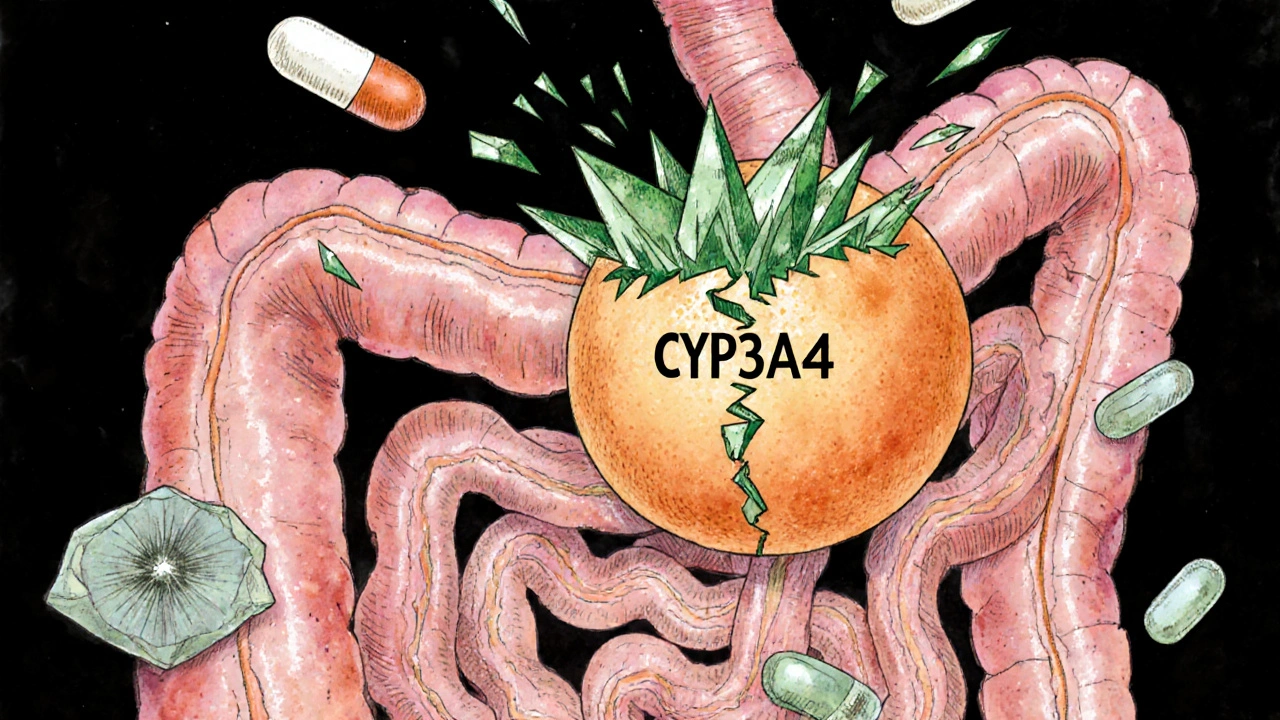
Other High-Risk Medications
Grapefruit doesn’t stop at statins and blood pressure drugs. It also interferes with:- Anti-anxiety meds like buspirone (Buspar) - can cause extreme drowsiness or low blood pressure.
- Anti-arrhythmics like amiodarone - increases risk of dangerous heart rhythms.
- Some antidepressants like sertraline (Zoloft) and trazodone - may raise serotonin levels too high.
- Anti-epileptics like carbamazepine - can lead to toxicity and confusion.
- Some opioids like oxycodone - increases sedation and breathing risk.
Why Timing Doesn’t Help
You might think: “I’ll just drink grapefruit juice in the morning and take my pill at night.” That won’t work. The enzyme damage is irreversible. Your gut can’t repair CYP3A4 right away. It takes days. So even if you space it out, the enzyme is still blocked. There’s no safe window. Some people try to avoid grapefruit only on days they take their pill. That’s still dangerous. The enzyme stays down for up to 72 hours. If you drank juice on Monday, your system is still vulnerable on Wednesday - even if you didn’t touch grapefruit in between.What to Do Instead
If you love grapefruit and take medication, here’s your action plan:- Check your meds. Look at the patient leaflet or ask your pharmacist. If it says “avoid grapefruit,” take it seriously.
- Ask about alternatives. For statins, switch to pravastatin or rosuvastatin. For blood pressure, ask if diltiazem or verapamil is an option. For immunosuppressants, your doctor may have other choices.
- Don’t guess. Even if you’ve taken grapefruit for years with no problem, that doesn’t mean it’s safe. The interaction can build up over time.
- Read labels. Grapefruit juice isn’t the only culprit. Some smoothies, cocktails, and even candies contain grapefruit extract.
- Talk to your pharmacist. Pharmacists screen for this interaction in 78% of cases. They’re your best ally.
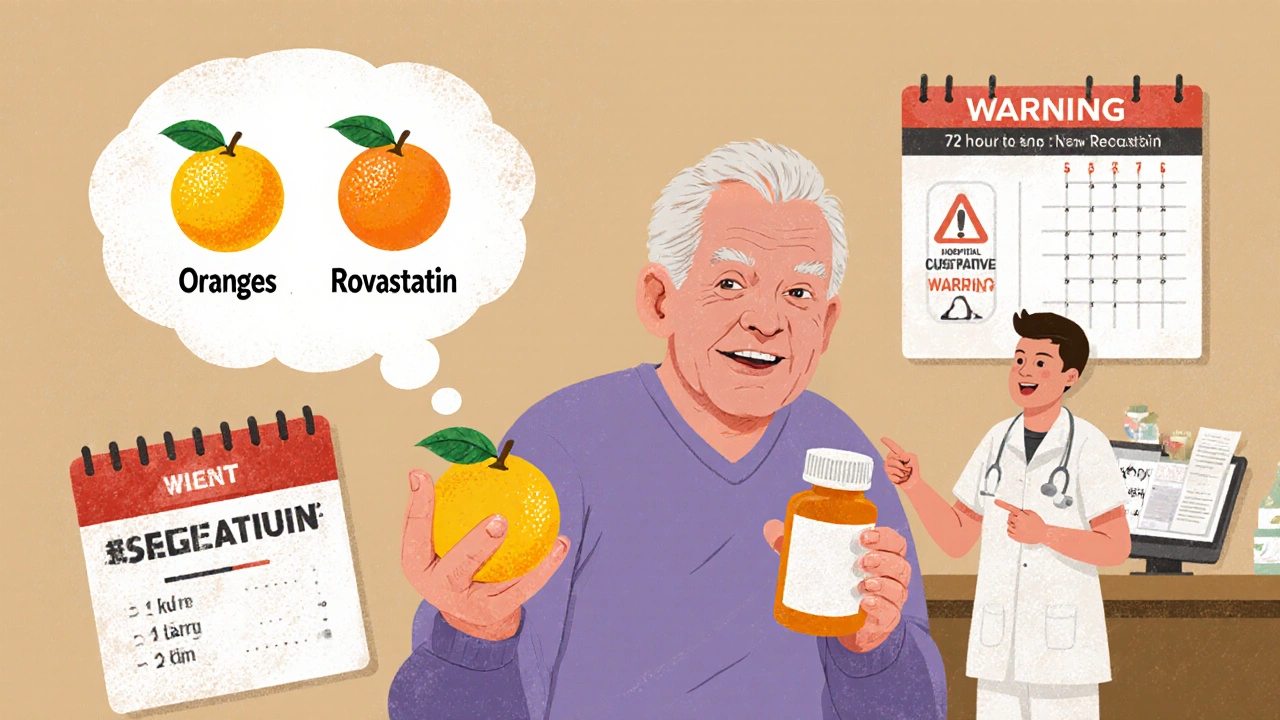
Who’s at Highest Risk?
This isn’t just about grapefruit. It’s about aging and polypharmacy. In the U.S., over half of adults 65+ take five or more prescription drugs. That’s a recipe for hidden dangers. Grapefruit-drug interactions cause about 10,000 adverse events every year - and most are preventable. Older adults are more likely to:- Take statins, blood pressure meds, or immunosuppressants.
- Drink grapefruit juice for its “health benefits.”
- Have reduced liver and kidney function - which makes side effects worse.
What’s Being Done?
Hospitals now use electronic health records with built-in alerts. If you’re prescribed a drug that interacts with grapefruit, your doctor’s system should flag it. As of 2023, over 90% of U.S. hospitals using Epic Systems have these alerts turned on. Researchers are also testing modified grapefruit. Some new varieties have 85-90% less furanocoumarin. Early results are promising. But until those are widely available and proven safe, the only safe choice is to avoid it. The American Heart Association says it clearly: “Complete avoidance is the only recommended strategy.” No exceptions. No compromises.Final Advice
You don’t have to give up citrus forever. Just avoid grapefruit, Seville oranges, and pomelos. Swap them for oranges, tangerines, or berries. Your body will thank you. If you’re on any of these drugs - statins, blood pressure meds, immunosuppressants, or others - ask your doctor or pharmacist: “Does this interact with grapefruit?” Don’t wait for them to tell you. Ask. It could save your life.Can I drink grapefruit juice if I take my medication at night?
No. Grapefruit damages enzymes in your gut that last for 24 to 72 hours. Even if you take your pill at night and drink juice in the morning, the enzyme is still blocked. Timing doesn’t prevent the interaction.
Are all citrus fruits dangerous with medications?
No. Only grapefruit, Seville oranges (used in marmalade), pomelos, and possibly limes contain furanocoumarins. Regular oranges, tangerines, and clementines are safe. Apple juice and cranberry juice don’t cause these interactions.
What should I do if I accidentally drank grapefruit juice with my medication?
If you only had a small amount and feel fine, monitor for symptoms like dizziness, muscle pain, weakness, or irregular heartbeat. If you’re on a high-risk drug like simvastatin or tacrolimus, contact your doctor or pharmacist immediately. Don’t wait for symptoms to appear - some reactions are silent.
Can I switch to a different statin to avoid grapefruit interactions?
Yes. Pravastatin (Pravachol) and rosuvastatin (Crestor) do not interact with grapefruit because they’re metabolized differently. If you love grapefruit and are on simvastatin or lovastatin, ask your doctor about switching. It’s a simple change that removes the risk entirely.
Do over-the-counter supplements interact with grapefruit too?
Some do. Supplements like St. John’s wort, melatonin, and certain herbal products can be affected. Always check with your pharmacist before combining any supplement with your prescription meds - grapefruit isn’t the only food that causes problems.

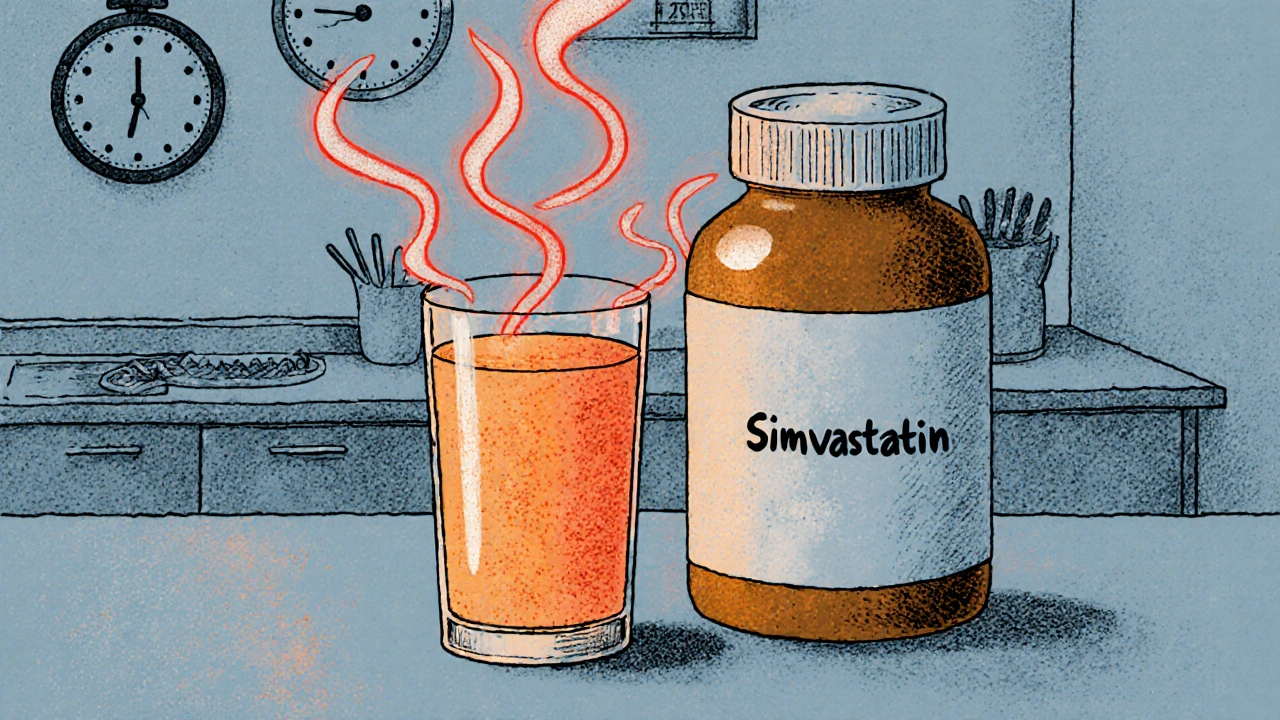

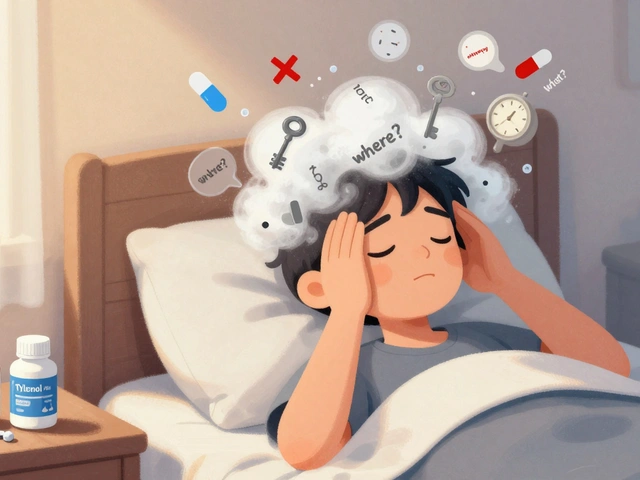
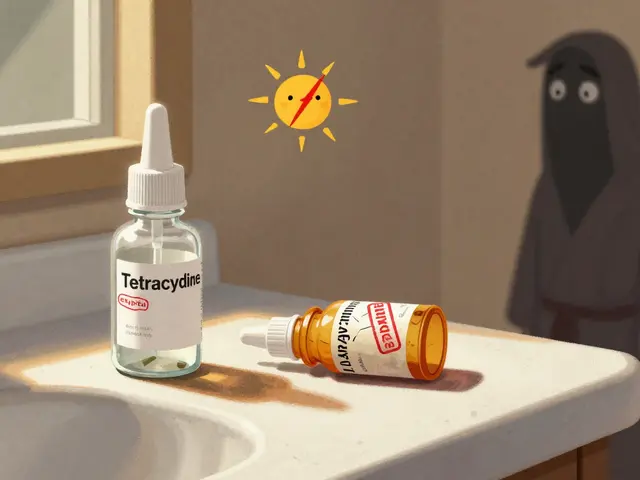
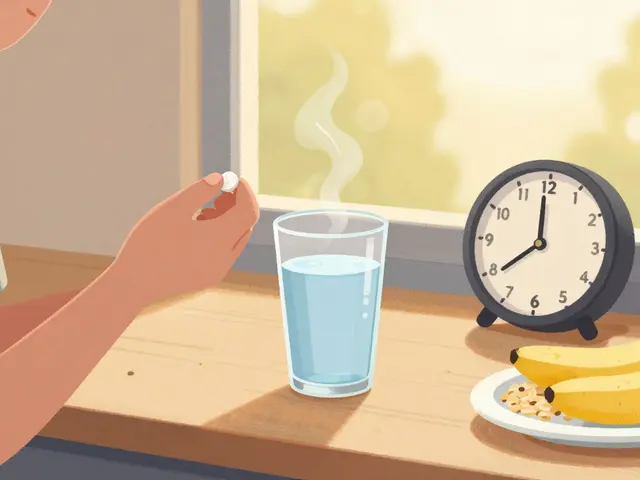

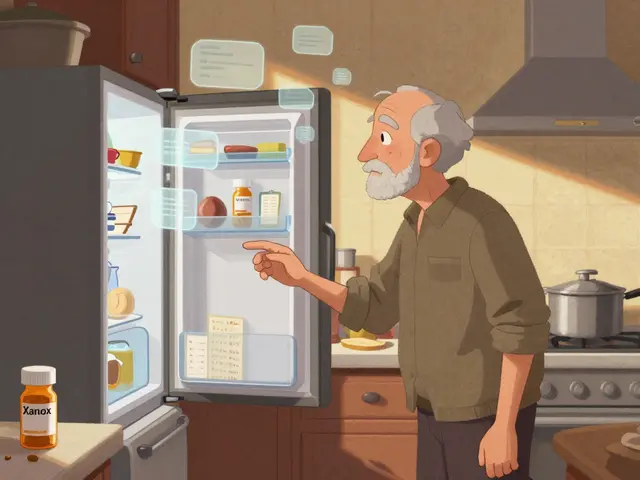
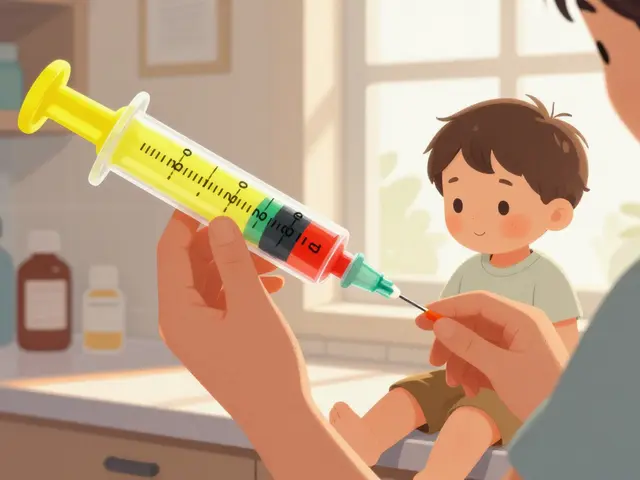
Christopher Robinson
20 Nov 2025 at 05:08Just found out my grandpa’s on simvastatin and drinks grapefruit juice every morning… 😳 I’m sending him this post right now. Seriously, people need to know this isn’t just a "maybe" thing-it’s a "you might end up in the ICU" thing. Thanks for laying it out so clearly.